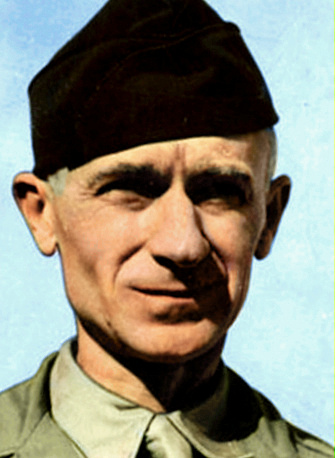‘Are you all right?’ Ernie asked of major just as bullet hit him
Pyle lived 2 or 3 minutes, officer said, but he was unconscious all the while
By Bryce Watson, USCG combat correspondent
This story just arrived. It tells of Ernie Pyle’s last words, and details of the ambush of which he was the victim. His last column is printed today, on this page.
ON THE IE SHIMA BEACHHEAD (delayed) – I watched a battered jeep return with the body of Ernie Pyle, bringing him 500 yards from the forward area.
The Ie Shima terrain is smooth here, looking like the Indiana farmland where he was born – except it is broken by lines of advancing tanks and tractors.
Maj. George H. Pratt, who was beside Ernie on that tragic instant, was sitting wearily in front of an abandoned Jap cave.
“Ernie Pyle,” Maj. Pratt said softly, “was worth two divisions as a morale factor alone.”
Ernie’s body had just been recovered from beneath the machine gun and sniper fire up ahead by John J. Barnes of Petersburg, Virginia. He was the driver of the jeep when it happened, and had remained with Ernie, pinned down by fire.
5 start out in jeep
The body was resting near Maj. Pratt. Ernie’s battledress was unpressed, his dusty shoes shielded from the sun by a poncho.
“He was one of the enlisted men really,” Maj. Pratt said.
When the jeep had started out, hours before, there had been four men in it besides Ernie – Dale Bassett from Denver, Colorado; Lt. Col. L. B. Coolidge of Helena, Arkansas; Barnes, the driver, and Maj. Pratt, who is from Eugene, Oregon. They were driving to the front lines.
Suddenly, a Jap machine gun opened up.
The swath of fire swung to the right and swept under the jeep which pitched to a halt.
Dive into ditches
All five men went into the ditches. Barnes dived to the left, the others to the right.
The machine gun swept back and forth across their positions.
“I looked to my left,” said Maj. Pratt. “Ernie looked at me and smiled. He raised up slightly and said: ‘Are you all right?’”
There had been a slight break in the firing. Just as Ernie Pyle asked his question, a burst got him.
Lives several minutes
“He went backward slowly,” Maj. Pratt said. “It was a head wound. Thank God he never knew what happened. It was two or three minutes before he was dead, maybe, but he was unconscious all the time.”
The machine gun was joined by sniper fire. All four men on the right side of the road managed to crawl away.
But Barnes had to remain until a special detail of infantrymen cleaned out the area, about four and a half hours later.
Then Barnes drove his flat-tired jeep back with Ernie’s body.
Voice breaks
As I talked to Maj. Pratt, his voice broke several times.
“He was so damned modest and human,” he said.
I walked toward the beach, to the temporary burial ground. Men were standing about, saying nothing.
There were other dead there. In death, Ernie Pyle was lying among the common, trudging foot soldiers – the brave men – he had glorified in life.
